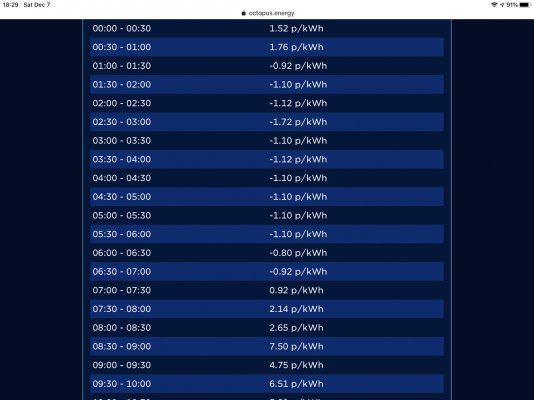This article explains why at certain times of the year the over production of electricity results in the prices going negative and the company pays you the consumer for using electricity.
I have just received an alert that the prices are going negative between 1 and 7am so I have just set the solar panel inverter to fully charge the batteries during this period, then we’ll have been paid to have free electricity all morning, then I’ll charge the batteries again during the afternoon cheap rates to cover the expensive evening period. Normally the batteries are charged during the day by the solar panels but can be charged by pulling power from the grid. (Excess power generated during the day is exported to the grid and we get paid for that, but this is the first time we have been paid to use electricity)
This is fun stuff for a geek like me.
https://octopus.energy/agile/
I have just received an alert that the prices are going negative between 1 and 7am so I have just set the solar panel inverter to fully charge the batteries during this period, then we’ll have been paid to have free electricity all morning, then I’ll charge the batteries again during the afternoon cheap rates to cover the expensive evening period. Normally the batteries are charged during the day by the solar panels but can be charged by pulling power from the grid. (Excess power generated during the day is exported to the grid and we get paid for that, but this is the first time we have been paid to use electricity)
This is fun stuff for a geek like me.
https://octopus.energy/agile/
Plunge Pricing pays you to take excess energy off the grid
Across the UK, whenever more electricity is generated than consumed, energy prices fall – sometimes to the point where prices drop below zero, and suppliers are paid to take energy off the grid.
Agile Octopus introduces Plunge Pricing – a world first that lets you take advantage of these negative price events, and get paid for the electricity you use. Receive SMS alerts whenever prices drop below zero, or use our API to program your smart devices.
Over the last 12 months, unit prices dropped below 2p / kWh 31 times.
Attachments
Last edited:

